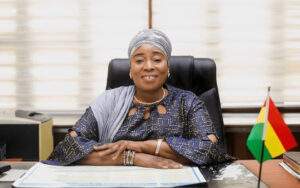The National Gender Policy to support the Affirmative Action Bill has expired – Minister

The National Gender Policy (2015) serving as the supporting policy framework for the approval of the Affirmative Action Bill has expired, Ms Lariba Zuweira Abudu, the Minister of Gender, Children and Social Protection, said on Tuesday.
However, the Ministry had, through stakeholder consultation, revised and finalised the National Gender Policy (2023-2032) to give backing to the Bill, with a Cabinet Memorandum being finalised for submission to Cabinet.
Ms Abudu said this on the floor of Parliament in response to a question asked by Mr Peter Kwasi Nortsu-Kotoe, a National Democratic Congress (NDC) Member of Parliament (MP) for Akatsi North, on behalf of Ms Lydia Lamisi Akanvariba, an NDC MP for Tempane.
Mr Nortsu-Kotoe asked the Minister about the status of the Affirmative Action Bill and what urgent steps the Ministry was taking to fast-track its passage.
“Mr Speaker, on my assumption of office as the substantive Minister of Gender, Children and Social Protection in January 2023, the Affirmative Action Bill was resubmitted on 2nd March 2023 to Cabinet for consideration and approval,” she said.
Ms Abudu, also the New Patriotic Party MP for Walewale, told Parliament that in anticipation of Cabinet’s approval of the Bill, the Ministry would engage the leadership of Parliament, the Women’s Caucus, Standing Committee on Gender and Children, as well as the Select Committee on Constitutional, Legal and Parliamentary Affairs to fast-track the process.
Mr Nortsu-Kotoe, therefore, urged Ms Abudu to see to the Bill being passed, particularly when she had the full support of the House.
“…Hon Minister, this is an important Bill, which is long overdue, I urge you to see to its passage having the full support of the House,” he said.
On Thursday, December 15, 2022, when Ms Abudu, the then Minister-nominee, appeared before the Appointments Committee to be vetted, she said the Affirmative Action Bill was a key bill she would look at when approved as the substantive minister.
She said the citizens needed the Bill and she was sure that President Akufo-Addo would be very conversant to leveraging its passage, especially when he was a gender champion.
Madam Elizabeth Ofosu-Adjare, a Member of the Appointments Committee and an NDC MP for Techiman North, asked for her observation on what she described as “a long overdue bill.”
“Mr Chairman, so the bill is in Cabinet, we will draw it and relay it. I have looked at it and I think that a lot of consultation has to be done with members of Parliament both female and male,” Ms Abudu said.
“When we come together we can do it. So, I will knock on your doors to help me so as to pass it.”
Ghana legislated an Affirmative Action Act in the middle of 1960, which allowed 10 women members to represent the regions of the country in the then Legislature.
The law recognised that women’s political participation was a critical component of democratic dialogue and social cohesion but their representation in all policy-making spaces in Ghana stand below the United Nations threshold of 30 per cent.
Currently, women’s representation in Ghana’s Parliament stands at 14.5 per cent, while in the District Assembly System it is below five per cent.
The situation is no different in the Government’s ministerial, ambassadorial, and board appointments.
The persistent low representation of women in these key decision-making spaces makes it nearly impossible for their effective contributions to Ghana’s development.
Source: GNA
